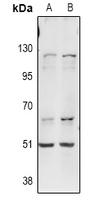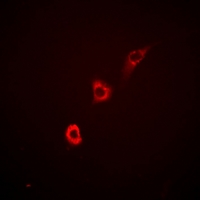

| WB | 咨询技术 | Human,Mouse,Rat |
| IF | 咨询技术 | Human,Mouse,Rat |
| IHC | 咨询技术 | Human,Mouse,Rat |
| ICC | 1/100-1/300 | Human,Mouse,Rat |
| FCM | 咨询技术 | Human,Mouse,Rat |
| Elisa | 咨询技术 | Human,Mouse,Rat |
| Aliases | Inositol-trisphosphate 3-kinase A; Inositol 145-trisphosphate 3-kinase A; IP3 3-kinase A; IP3K A; InsP 3-kinase A |
| Entrez GeneID | 3706; |
| WB Predicted band size | 51kDa |
| Host/Isotype | Rabbit IgG |
| Antibody Type | Primary antibody |
| Storage | Store at 4°C short term. Aliquot and store at -20°C long term. Avoid freeze/thaw cycles. |
| Species Reactivity | Human,Mouse,Rat |
| Immunogen | KLH-conjugated synthetic peptide encompassing a sequence within the C-term region of human ITPKA. |
| Formulation | Purified antibody in PBS with 0.05% sodium azide. |
+ +
以下是关于ITPKA抗体的3篇参考文献,涵盖不同研究领域:
1. **"ITPKA promotes metastasis via the AKT signaling pathway in lung adenocarcinoma"**
- **作者**: Windhorst S, et al.
- **摘要**: 该研究利用ITPKA特异性抗体,通过免疫组化和Western blot分析,揭示了ITPKA通过激活AKT信号通路促进肺腺癌转移的机制。抗体验证了ITPKA在转移性肿瘤组织中的高表达。
2. **"Inositol 1.4.5-trisphosphate 3-kinase A regulates dendritic spine morphology and synaptic plasticity"**
- **作者**: Scheuss V, et al.
- **摘要**: 研究通过免疫荧光和ITPKA抗体定位,证明ITPKA在神经元树突棘中的表达,并调控突触可塑性和形态,为神经发育障碍提供潜在分子机制。
3. **"ITPKA serves as a prognostic biomarker and correlates with immune infiltration in colorectal cancer"**
- **作者**: Jiang L, et al.
- **摘要**: 基于ITPKA抗体的免疫组化分析,发现ITPKA在结直肠癌中高表达且与不良预后相关,提示其作为预后标志物及免疫微环境调节因子的潜力。
这些文献展示了ITPKA抗体在癌症机制、神经科学及临床诊断中的应用。如需扩展,可进一步检索抗体开发或特定疾病模型的研究。
The ITPKA antibody targets the inositol 1.4.5-trisphosphate 3-kinase A (ITPKA), an enzyme encoded by the *ITPKA* gene. ITPKA catalyzes the phosphorylation of inositol 1.4.5-trisphosphate (IP3) to inositol 1.3.4.5-tetrakisphosphate (IP4), regulating intracellular calcium signaling and cytoskeletal dynamics. Overexpression of ITPKA has been implicated in cancer progression, particularly in metastasis, by promoting actin reorganization, enhancing cell motility, and modulating calcium-dependent pathways.
ITPKA antibodies are widely used in research to study its expression patterns, functional roles, and pathological mechanisms. In cancer biology, these antibodies help identify ITPKA's upregulation in tumors like lung, breast, and colon cancers, correlating with poor prognosis. They are employed in techniques such as Western blotting, immunohistochemistry (IHC), and immunofluorescence (IF) to assess protein localization and expression levels.
Additionally, ITPKA antibodies aid in exploring its interaction with cytoskeletal proteins and signaling molecules, shedding light on pathways driving invasion and metastasis. Recent studies also suggest ITPKA as a potential therapeutic target or biomarker. Validation of these antibodies often involves knockout cell lines or siRNA-mediated silencing to confirm specificity. As research advances, ITPKA antibodies remain critical tools for unraveling its dual role as a kinase and actin-binding protein in health and disease.
×